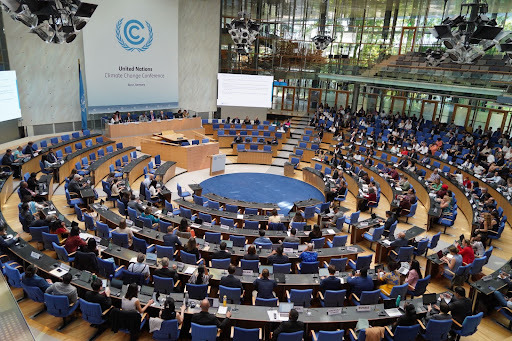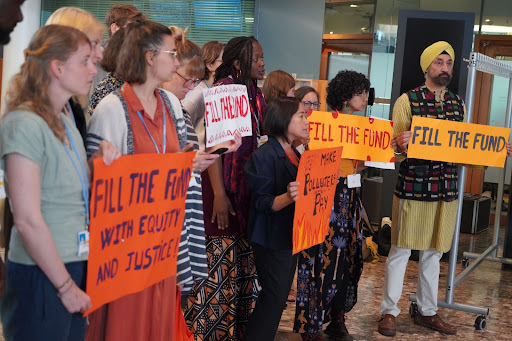News
Placing citizens at the heart of global climate (and energy) negotiations
As inequalities grow, more frequent extreme weather phenomena disrupt and upend livelihoods, it’s easy for citizens to ignore or even feel contempt towards global climate negotiations. Delegates from across the world are descending in the quaint German city of Bonn for the Climate Change conference - SB58. These “intersessional” negotiations serve as a mid-year stop gap to ensure progress in various files and work programmes between the UNFCCC Conferences of the Parties (COP27 in Egypt and COP28 in the United Arab Emirates). While less flashy than their COP counterparts, the intersessionals are crucial for achieving substantial progress across technical details and political hurdles. To understand how these global negotiations relate to the everyday lived experiences of local (energy) communities, let’s delve into the key agenda issues.

Renewable Energy Communities: Local Solutions with Global Impact
Renewable energy communities can be viewed as a concrete tool that can translate important global concepts into locally applicable solutions. Energy communities are already widely recognised in the European Union, as evidenced by their inclusion in the FitFor55 files (i.e. Energy Efficiency Directive, Renewable Energy Directive, Electricity Market Design, European Performance of Buildings Directive…). European legislators have thus acknowledged the need to involve citizens, SMEs, and Municipalities in the (domestic) clean energy transition process. Europe should now advocate for the right of local and community ownership of energy in international climate negotiations.
Global Phase-out of fossil fuels and a Global Goal for Renewables
In an ironic twist of fate, the record-breaking wildfires scorching Canada, which have clouded large parts of the United States in choking air pollution, have disrupted oil and gas production in Alberta. The world is increasingly facing the following dilemma: either rally around the need to phase out fossil fuels in a managed and socially acceptable way, or face catastrophic, cascading consequences in the form of extreme weather phenomena, and major economic and supply disruptions. The Glasgow COP26 cover decision for the first time ever called for the phase out of unabated coal. Building on this, at COP27 in Sharm el Sheikh, 80 countries supported an -ultimately unsuccessful- resolution to phase out all fossil fuels. More and more countries, regions, states, and cities are signing on to the Fossil Fuel Non Proliferation Treaty, a global initiative aiming to phase out fossil fuels equitably. Momentum is growing for setting a global target to phase out fossil fuels. But the topic remains politically contentious. Exemplary is the fact that the topic didn’t make it into the official agenda of SB58, which is unlikely to change at COP28 due to the host country’s (the United Arab Emirates, (UAE) entrenched conflicts of interest, as a major oil and gas producer. However, to align with the International Energy Agency and the Intergovernmental Panel on Climate Change which report the need for a 3% annual decline of oil and gas production and use within the 2020s, a concerted effort is needed
“The fossil fuel era is clearly coming to an end. We didn’t stop the slave trade because we ran out of slaves. In the same way, the fossil fuel era needs to be brought to a close before we run out of fossil fuels. If we want to live on a habitable planet we need to leave our current fossil fuel reserves in the ground.”
Mohamed Adow, Director of Power Shift Africa
Energy communities can significantly accelerate the transition from fossil fuels, while ensuring social justice and lower energy costs for households. By 2050, around 45% of renewable energy production could be in the hands of citizens, about a quarter of which could come through participation in cooperatives. Moreover, the time to unlock finance is now, as EU citizens alone have the capacity to invest up to 240 billion euros toward the energy transition by 2030. Party negotiators at SB58 are increasingly floating the idea of a global goal for renewables installations to be agreed during COP28 (up to 1,5TWp of capacity per year by 2030). This is a step in the right direction that must be complemented with specific sub-goals for local and community energy ownership. Certain countries in Europe, including Denmark, the Netherlands, and Scotland, have been pioneers in this direction. In the Netherlands, the goal is for 50% of all renewables to be in the hands of communities by 2030. The EU should build on these examples and strive for community ownership of renewables at an international level. Thus, phasing out fossil fuels globally, and equitably, goes hand in hand with phasing in community-owned renewable projects.
Just Transition Work Programme
The Just Transition Work Programme, launched at COP27 in Sharm el Sheikh, aims to establish a political consensus on what constitutes a ‘just transition’ and how it can be operationalised within the Paris Agreement. The aim is for the SB58 to produce a technical text that will be agreed on during the political phase of COP28 in the UAE. The polycrises of the climate crisis, growing socioeconomic inequality, and the invasion of Ukraine, are all sowing rising social discontent. The programme builds on the principles of ‘social dialogue’ and ‘social protection’ to ensure that social justice is intrinsically linked with climate justice.
Europe’s Just Transition agenda is a case in point: From Czechia to Greece, and from Poland to Spain, Member States are taking steps to ensure territorial and social cohesion. Many of them are integrating energy communities into their Territorial Just Transition Plans, thus acknowledging their role in promoting renewable energy and creating new sustainable jobs in regions that most need them. Energy communities can revitalize rural and peripheral communities by creating new jobs and cultivating new skills. Especially for countries, or regions, that are heavily reliant on fossil fuels, funding for fossil fuels (e.g., subsidies) should be repurposed towards community-led solutions that enhance local resilience and build new economic opportunities. To truly leave no one behind, countries must ensure that the benefits of the energy transition are shared equally.
Mitigation Work Programme
The Mitigation Work Programme, established during COP26 in Glasgow, aims to enhance efforts to rapidly reduceGHG emissions, while scaling countries’ climate ambition. Considering that current policies and pledges put us on track for up to a catastrophic 2,7oC of warming, this Work Programme is set to dominate global negotiations up to the 2030s.
Energy communities can equally deliver significant energy and carbon savings. Specifically, Joining a renewable energy cooperative leads to more than 10% of reductions in energy demand. This is because energy communities promote sufficiency and sobriety measures amongst their members, but can also deliver important services like citizen-led renovation and community-led heating and cooling solutions. In Ireland, a local energy community has renovated over 800 homes and 25 communal buildings, thus marking 8.8GWh of energy savings. Local energy communities can thus significantly contribute to mitigation and adaptation efforts.
Rewiring Global Financial Flows
In line with article 2.1(c) of the Paris Agreement, which calls for aligning financial flows with the 1,5 degree target, it is imperative for Parties to cease funding fossil fuels and instead support solutions that promote the energy transition while building social resilience. However, the world is currently far from meeting this target, with over a trillion euros in global subsidies for fossil fuels in 2022.
“Our research shows that from 2019 to 2021, G20 countries and the major multilateral development banks (MDBs) provided at least USD 55 billion per 4 year in international public finance for oil,gas, and coal. This is taking away crucial resources for real solutions, like community energy,”
Laurie Vanderbourg, Oil Change International

Climate and renewable energy finance is just a fraction of global financial flows into the energy sector. At the same time, climate finance faces two major structural challenges. Firstly, there is no transparent, universally accepted definition of climate finance’. Because of this, billions of euros earmarked for climate objectives end up supporting fossil fuel projects, like gas or ‘clean coal’ (or even hotels and chocolate stores). The lack of transparency also means that resources are not reaching their intended beneficiaries. Estimates show that only 1-10% of all global finance reaches local communities.
Secondly, the heavy focus on debt-generating instruments, such as high interest loans, places recipient countries in debt traps. Alarmingly, 93% of the countries most vulnerable to the climate crisis are in debt distress, or at significant risk of debt distress. To effectively reform the global climate finance regime, a shift towards grants-based finance is required, accompanied by a greater emphasis on transparent, community-led solutions. For instance, financing storage, microgrid, and district level housing renovation and heating & cooling projects, can create local energy security, independence, and resilience.
A joint analysis by REScoop.eu, CE Bankwatch and CAN-EU has shown that out of the 19 European Member States analyzed, 11 are planning to allocate millions of euros to support energy communities through their Recovery and Resilience, Cohesion, and Modernisation Funds. This growing recognition at European level indicates that to achieve inclusive decarbonisation, local community projects must be actively supported.
Looking ahead
As global climate negotiations continue, it is crucial to prioritize the involvement of citizens and local communities. However, trying to balance the global with the local is a complicated exercise, mired in confusion and disillusionment. The global seems too abstract, removed and undemocratic. The local often seems too small or too little. The community energy movement is well placed to balance this equation: it maintains a strong local presence, proposing concrete actions, while at the same time forming regional, national and international coalitions, advocating for energy democracy at the EU and even global levels.
People are increasingly disillusioned by the neoliberal economic order, leading to apathy and a slide to reactionary authoritarianism. This shrinking social space is evident even within the UNFCCC processes, with two back-to-back COPs being hosted in autocratic countries, such as Egypt and the UAE. Not despite, but because of these reasons the community energy movement must step up its work. By creating and promoting visions of clean, democratic futures, the movement can inspire and mobilise communities worldwide. These visions should be grounded in our shared global challenges (the climate crisis, growing inequalities etc.), but must also speak to the lived realities and needs of local communities. From Egypt to Bonn, and to the UAE, the world is racing in multiple directions - both positive and negative. But one thing is certain: the community energy revolution is also moving - slowly, but steadfastly forward.